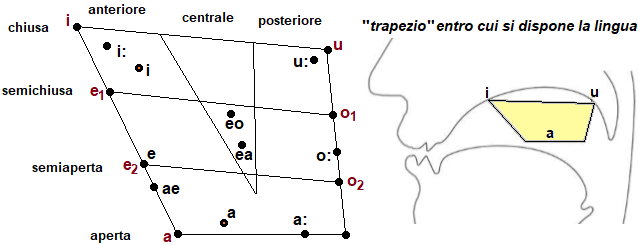
| A | ei | for | Alpha / Apple | N | en | for | Nelly | |
| B | bi | Bob / Bravo | O | o | Orange | |||
| C | si | Charlie | P | pi | Peter | |||
| D | di | Dog | Q | kiu | Queen | |||
| E | i | Ever | R | ar | Robert | |||
| F | ef | Freddy | S | es | Sugar | |||
| G | g | George | T | ti | Tango / Tommy | |||
| H | eic | Harry | U | iu | Umbrella | |||
| I | ai | Ink | V | vi | Victor | |||
| J | gei | John | W | dabliu | - | |||
| K | kei | Kettle | X | eks | Xerox | |||
| L | el | Lamb | Y | uai | York / Yacht | |||
| M | em | Mother | Z | sed | Zebra |
Suoni vocalici (la r finale è pronunciata se seguita da vocale)
ae a tendente ad e, eo e tendente ad o, ea e tendente ad a
Ascolta i suoni con google
ae: Bank, plaid.
ei After-shave, raid, display, break, after-eight, disk-jokey.
a: After-shave, garden, guardrail, laugh, heart.
ea Air-mail, tear, there.
o: All-right, walkie-talkie, crawl, caught, board, four, floor, court, hoarse.
e Check-in, breakfast.
eo: Bird, burn, fern, worm, earn, journal.
ea The, actor, nation, danger, cupboard.
ia Theatre, beer, tier.
i: Design, jeans, freezer, bikini, briefing, people.
i Identikit, building, body
er Girl, world. nursery.
ai Time, high, bye-bye, by night, buy, pie.
o Spot, watch, cough, laurel.
ou Coke, roast-beef, bowling.
au Scout, clown, plough.
oi Boiler, boy, lawyer.
a Love, young, club, does, blood.
u Football, bulldog, wolf, could
u: Boom, souvenir, cruise, move, shoe, flew, blue, rude.
uea Poor, tour.
iu News, duty-free, beautiful.
iuea Pure.
oiea Employer.
Nello schema precedente, la e, mentre in italiano ha variazioni tra la pronucia chiusa (1) [male] e quella aperta (2) [lei], in inglese è sempre aperta [yes]. Anche la o, che in italiano varia tra la pronucia chiusa (1) [io] e quella aperta (2) [oggi], in inglese ha un'unica pronuncia, a metà strada la chiusa e l'aperta [not]. La i e la a sono pronunciate in modo leggeremente diverso che in italiano (la i più aperta, la a più centrale):

In inglese sono pronuciate in modo leggermente diverso anche t e d, ossia sono pronunciate in modo alveolare (come l e n) invece che dentale, ossia la lingua non viene appoggiata ai denti, ma poco prima di essi.
| Simboli impiegati dall'IPA (International Phonetic Alphabet) |  |